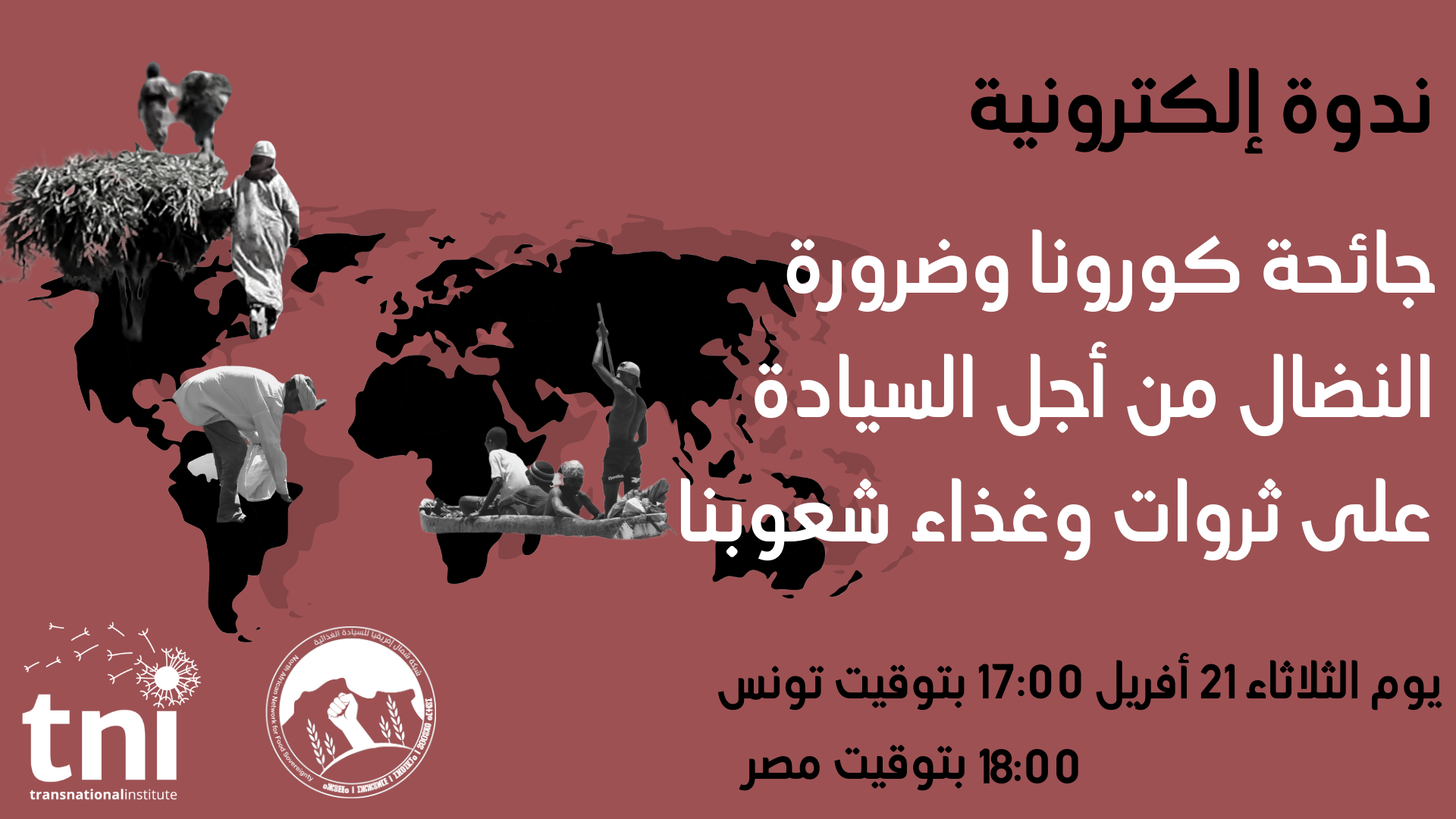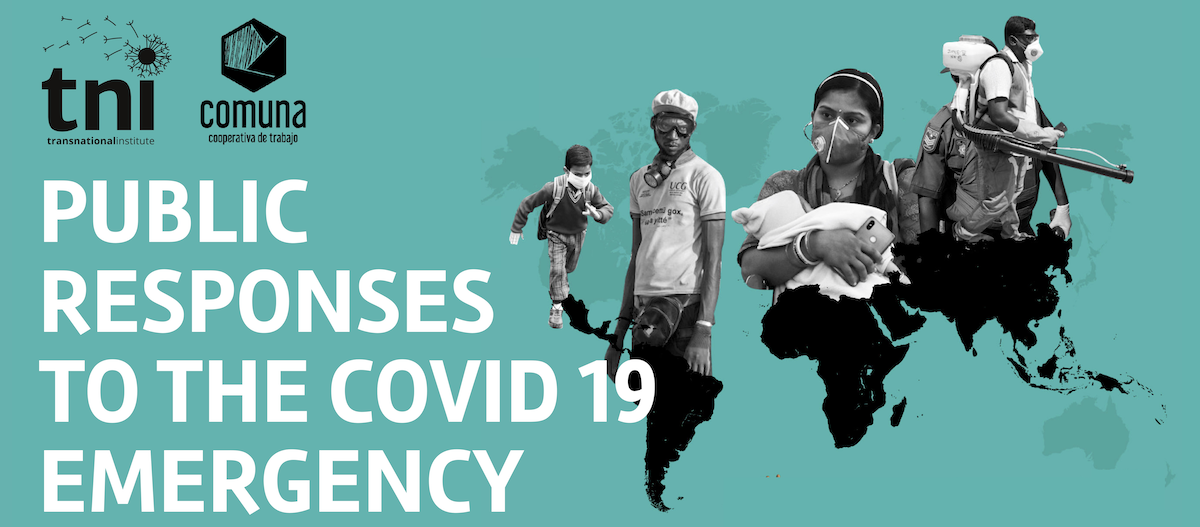|
|
|
Join TNI's Wednesday webinar in which we will explore the corporate interests profiting from health and the struggles to win back control.
Taking health back from corporations: 22 April webinar
Dear TNI supporter,
We hope you have been able to attend one of our recent Wednesday webinars. This week’s conversation with acclaimed evolutionary biologist Rob Wallace was so well attended that we maxed out our 1000 attendee limit! In case you missed it, you can catch up here.
Join us at 4pm CET on 22 April for our next webinar, which will explore more deeply the corporate interests profiting from health and the struggles to win back control. We will be joined by Susan George, a pioneering author and long-time analyst of corporate power, Mark Heywood, a cofounder of the Treatment Action Campaign that led an international movement to win access to medicines, Baba Aye who works with public sector health workers worldwide, Kajal Bhardwaj, a prominent Indian lawyer on health and trade policy, and David Legge of the People’s Health Movement.
Make sure you register to receive an invite and link to the webinar.
|
|
|
Panellists will discuss how changes to access to medicines, the pharmaceutical industry, healthcare systems, and the global governance of health can prevent future pandemics and bring about public healthcare for all.
Panellists:
- Susan George, Author and President of the Transnational Institute
- Mark Haywood, Co-founder of Treatment Action Campaign and COVID-19 Peoples’ Alliance,South Africa
- Kajal Bharadwaj, Independent Lawyer, expert on trade, health and human rights, India
- Baba Aye, Public Services International (PSI)
- David Legge, Peoples Health Movement
4pm (CET), Wednesday 22 April (ends 5:30pm)
The seminar is organised by TNI and co-sponsored by AIDC, Focus on the Global South, Peoples Health Movement (PHM), Public Services International, and Global Justice Now (GJN).
|
|
First Arabic language webinar
In addition, TNI is happy to announce its first Arabic language webinar: Corona pandemic and the necessity of the struggle for food sovereignty. On Tuesday, April 21st 17:00 Tunis time (18:00 Amsterdam time). Organised in cooperation with the North Africa Food Sovereignty Network. Please share with colleagues and partners who may be interested.
The Coronavirus pandemic is threatening to truly become a humanitarian disaster at a global scale and will have grave and disproportionate impacts on the vulnerable and marginalized groups, especially societies in countries of the Global South, including North Africa.

This global epidemic has exposed the scale of the catastrophe caused by decades of neoliberal policies in North African countries, from debt and privatizations to substantial austerity in the budgets dedicated to public services, including health. It also highlights the crucial role that small farmers, fisherfolks and agricultural workers play in producing our food, and this in the absence of adequate measures to protect them from the risk of infection. This health crisis has blatantly shown our economic and food dependence on global markets. In this webinar, we will try to situate this crisis in its global and regional contexts and relate it to the destructive impacts of an intensive capitalist agribusiness on humans and nature.
|
Panellists:
- Omar Aziki: Trade Unionist and Activist - ATTAC-CADTM Morocco and co-founder of North African Food Sovereignty Network.
- Layla Riahi: Researcher and Activist - Working Group for Food Sovereignty – Tunisia
- Mohamed Ramadan: Researcher in Economics - Initiative to Support Cooperatives – Egypt
- Atika Al Fazazi: Agricultural worker and trade unionist
- Chair: Fatima-Zahra El Belghiti
|
|
Online survey: A Global Survey on Public Sector Capabilities and Responses to the Pandemic

Together with COMUNA, a team of economists and social researchers based in Montevideo, Uruguay, TNI has launched a survey to map public sector responses to the pandemic.
In many countries the Corona crisis has led to a strong new appreciation of the public sphere. The crisis shows how essential public health systems. Countries with strong teams of scientists based at universities and other public research bodies have been able to implement massive testing. Many of the economic contingency policies in response to the crisis are being implemented through state-owned enterprises, including public banks. And as the pandemic expands, basic public services such as water and sanitation networks, energy and telecommunications become even more essential. Mapping and bringing out the magnitude and value of the public sector will greatly contribute to finding the most appropriate alternatives to deal with the worsening recession and to better prepare for a future beyond the pandemic.
|
|
The survey takes about 15-20 minutes. Please share with relevant contacts.
|
|
|
TNI is proud to provide our webinars and research for free, as a contribution to the movements and activists responding to this pandemic. However, it takes time and resources to organise these events, to research and to publish. If you would like to support us in this work, we would gratefully accept any donation you can make. Please donate here.
Sincerely,
Jess Graham
Community Builder
|
|
|
|
| | |